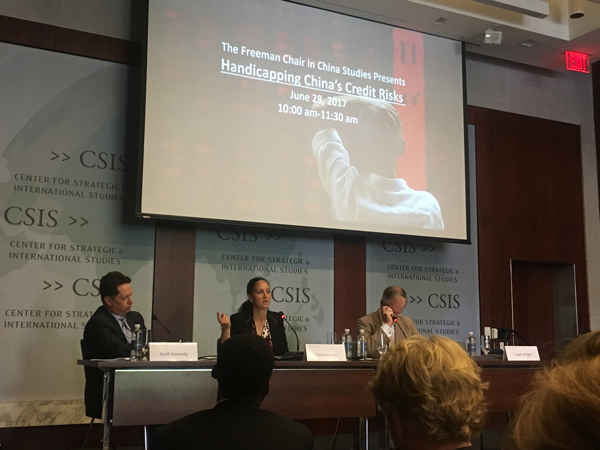WASHINGTON — The recent reduction in China’s credit rating by Moody’s Investors Ratings should not be blown out of proportion because the country still has time to implement key reforms, a top Moody’s official said Wednesday.
“We think China’s credit strength will provide time for reform. It’s just a matter of how fast the reform takes place,” Elena Duggar, chair of the Macroeconomic Board at Moody’s Investors Ratings, said during a speech at the Center for Strategic and International Studies.
On May 24, Moody’s downgraded its rating of China’s long-term local currency and foreign currency credit from Aa3 to A1, citing rising debt levels and slower economic growth. The credit rating is a measure of a government’s ability to repay its debt.
Despite the downgrade, Moody’s also issued a stable outlook on China, citing the country’s resilience to external conditions and expressing hopes for a financial reform in the near future.
While it is unlikely that China will experience an economic meltdown, other countries would be hurt by reduced trade rather than financial ties with the country if it happened, according to Duggar.
Nicholas Lardy, a Chinese economy expert at the Peterson Institute of International Economics, also cautioned against oversimplifying the diverse array of data that define China’s credit risk.
“The headline numbers are certainly pretty scary, but I think we need to disaggregate,” Lardy said. Lardy used the leverage ratio, which quantifies debt in relation to equity, to illustrate how the Chinese economy is performing.
“If you take the industrial sector, which is not as important as it used to be, and you look at the debt-to-equity ratio over the last decade, it has actually come down,” he said. “It is lower today than it was in 2006.”
He noted that the leverage ratio of state-owned enterprises has risen while that of private companies has dropped, arguing that the real burden of debt lies with the state-owned entities.
Both Duggar and Lardy pointed out that China’s policy of capital control, the government’s relatively small foreign debt, and the lack of securitization in both debt and equity markets make China’s economy less vulnerable to the economic conditions of other countries.
“Moody’s is a little late to the game. As most ratings agencies are, they’re a little late to upgrade or downgrade, much as we saw in the U.S. in 2008,” said Sheldon L. Ray, Jr., a portfolio manager in global equities and bonds who was in the audience at the CSIS event.
“Maybe Moody’s concerns were more relevant in 2015. I’ve come away today a bit more optimistic about China’s economy.”


